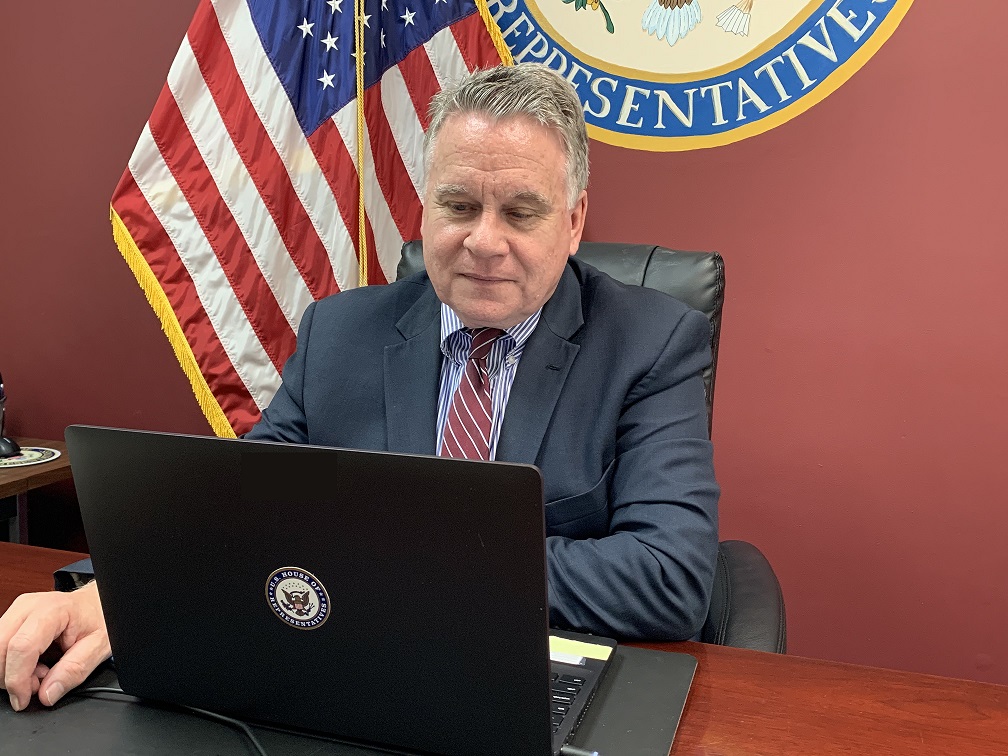Chris Smith holds virtual ‘town hall meeting’ with Alzheimer’s Assn.

Chris Smith holds virtual ‘town hall meeting’ with Alzheimer’s Assn.
FREEHOLD, NJ –Saying that “Alzheimer’s doesn’t stop and neither do we,” members, friends and advocates from the Alzheimer’s Association met with Rep. Chris Smith (NJ-04) for a virtual town hall “Coffee with Congress” to receive an update on federal efforts, and thank Smith for his steadfast advocacy.
“Congressman Smith is a true champion in the fight against Alzheimer’s…a man we all know and admire for his devotion to a world without Alzheimer’s,” said Christine Hopkins, Alzheimer’s Ambassador for the Fourth District who introduced the congressman to the broad virtual audience.
“He is a founding member of the bipartisan congressional Alzheimer’s task force…has written and sponsored many pieces of Alzheimer’s legislation over the years…and has also been ranked as one of the most bipartisan members of the House of Representatives. With his leadership in the House, I truly believe that one day we will have the first survivor and a world without Alzheimer’s,” Hopkins said.
Smith opened his remarks by thanking the Alzheimer’s Association, friends, supporters and staff in virtual attendance underscoring the organization’s leadership in helping to find a disease modifying drug, intervention, or cure by 2025.
“You have been true advocates and you have made a difference,” Smith said.
Smith briefed the meeting participants on efforts underway to stop the disease, currently the sixth-leading cause of death in the United States, which disproportionately affects women both as patients and as family caregivers. It is estimated that in the US, more than 13 million women are either suffering from Alzheimer’s or caring for someone who has it, and almost two-thirds of Americans living with Alzheimer’s are women.
Smith expressed deep concern regarding the disproportionate number of nursing home and long-term care residents—many with Alzheimer’s disease and other forms of dementia—who have contracted the coronavirus, saying that more than half of those who have died from COVID-19 in New Jersey resided in a long-term care facility.
“My heart breaks for all of the Alzheimer’s patients, veterans and others in long-term care who have lost their lives to COVID-19,” he said. “I am working on legislation to ensure that these facilities meet new transparency standards to keep family members and medical personnel informed about a resident’s health and status and to ensure that these facilities are better prepared with needed protective equipment to help combat the spread of viruses.”
Smith also discussed the added emotional and financial toll on many caregivers who have been without assistance to care for those at home or have been unable to see their family members with Alzheimer’s who are quarantined and lonely in long-term care facilities.
“My empathy for caregivers couldn’t be stronger. My mother spent the final year of her life in my home, and it’s ‘round the clock. We need to work for the caregivers as never before.”
Smith announced that he is pushing the US Treasury Department to expand the new Paycheck Protection Program and the Mainstreet Lending Program in the CARES Act so that nonprofit organizations such as Alzheimer’s Association, the American Heart Association and others can get forgivable loans to survive the pandemic and pay their employees who otherwise will be without jobs.
“Both charities have more than 500 employees across the country to carry out their respective missions of caregiver support, intensive volunteer awareness campaigns, research and fundraising activities such as walks or galas—which have been shut down during the social distancing and stay-at-home orders,” Smith said. “The federal support in the CARES Act is a lifeline, and our nonprofits need the help as well.”
The Alzheimer’s Association has made several changes in the way it supports families since the COVID-19 pandemic began, including moving meetings to online platforms, conducting virtual webinars, offering personalized care consultations by telephone and mail, and more. The Association is also providing 24/7 support for those family caregivers struggling with a family member with Alzheimer’s and dementia. But fundraising activities such as charity walks have ground to a halt because of government orders.
On research, Smith cited delays in some of the nearly 686 clinical trials currently underway for Alzheimer’s and acknowledged the impact of sheltering in place and the fact that some participants and researchers have been sick.
“The FDA has been laser-focused on COVID-19, and less focused on ongoing projects because of the very real emergency of this pandemic. But we are hopeful research will continue in earnest again very soon,” he said.
Twenty years ago, Smith and then-Rep. Ed Markey (D-MA), who now serves in the Senate, formed the bipartisan Alzheimer’s caucus in the House of Representatives.
“We started with 30 and we now have over 150 bipartisan members who are part of our coalition; the Senate has followed suit as well. Why is that important? Because there are now people on all different committees—as well as staffers—who are better informed, committed and motivated to find a cure. There is always a place where they can make an Alzheimer’s connection.”
Smith said the caucus has successfully worked for increased federal funding for research and caregiver support programs as well.
“In the last few years the impact has been undeniable,” Smith said. “Federal funding went from $600 million in 2015 to the current $2.8 billion, and the caucus is seeking an additional $350 million for fiscal 2021.”
Of the ongoing commitment to find a cure and reach federal funding goals, Smith added, “I have every confidence that the President and appropriators are ‘all in’ to increase the appropriation.”
For the latest version of this release, click on:
https://chrissmith.house.gov/news/documentsingle.aspx?DocumentID=406728








